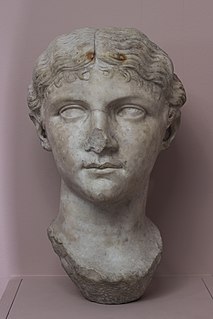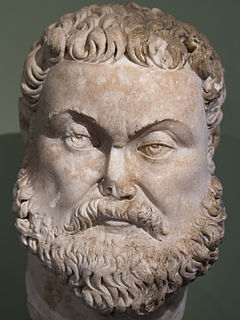 W
WDamnatio memoriae is a modern Latin phrase meaning "condemnation of memory", indicating that a person is to be excluded from official accounts. There are and have been many routes to damnatio memoriae, including the destruction of depictions, the removal of names from inscriptions and documents, and even large-scale rewritings of history. The term can be applied to other instances of official scrubbing; the practice is seen as long ago as the aftermath of the reign of the Egyptian Pharaohs Akhenaten in the 13th century BC, and Hatshepsut in the 14th century BC.
 W
WCaracalla, formally known as Marcus Aurelius Antoninus, was Roman emperor from 198 to 217. He was a member of the Severan dynasty, the elder son of Septimius Severus and Julia Domna. Co-ruler with his father from 198, he continued to rule with his brother Geta, emperor from 209, after their father's death in 211. His brother was murdered by the Praetorian Guard later that year, supposedly under orders from Caracalla himself, who then reigned afterwards as sole ruler of the Roman Empire. He found administration to be mundane, leaving those responsibilities to his mother, Julia Domna. Caracalla's reign featured domestic instability and external invasions by the Germanic peoples.
 W
WFlavius Julius Crispus was the eldest son of the Roman emperor Constantine the Great and his junior emperor (caesar) from March 317 until his execution by his father in 326. The grandson of the augustus Constantius I, Crispus was the elder half-brother of the future augustus Constantine II and became co-caesar with him and with his cousin Licinius II at Serdica, part of the settlement ending the Cibalensean War between Constantine and his father's rival Licinius I. Crispus ruled from Augusta Treverorum (Trier) in Roman Gaul between 318 and 323 and defeated the navy of Licinius I at the Battle of the Hellespont in 324, which with the land Battle of Chrysopolis won by Constantine forced the resignation of Licinius and his son, leaving Constantine the sole augustus and the Constantinian dynasty in control of the entire empire. It is unclear what was legal status of the relationship Crispus's mother Minervina had with Constantine; Crispus may have been an illegitimate son.
 W
WMarino Faliero was the 55th Doge of Venice, appointed on 11 September 1354.
 W
WFlavia Maxima Fausta was a Roman empress. She was the second wife of Constantine the Great, who had her executed and excluded from all official accounts, possibly due to adultery with her stepson, Crispus.
 W
WJulia Domna was Roman empress from 193 to 211 as the wife of Emperor Septimius Severus. She was born in Emesa in Roman Syria to an Arab family of priests of the deity Elagabalus. In 187, she married Severus, who at the time was governor of the Roman province of Gallia Lugdunensis. They had two sons, Caracalla and Geta. A civil war over the Roman throne broke out in 193, and shortly afterwards Severus declared himself emperor. The war ended in 197 with the defeat of the last of Severus's opponents.
 W
WClaudia Livia Julia was the only daughter of Nero Claudius Drusus and Antonia Minor and sister of the Roman Emperor Claudius and general Germanicus, and thus the paternal aunt of the emperor Caligula and maternal great-aunt of emperor Nero, as well as the niece and daughter-in-law of Tiberius. She was named after her grandmother, Augustus' wife Livia Drusilla, and commonly known by her family nickname Livilla. She was born after Germanicus and before Claudius.
 W
WMaximian, nicknamed Herculius, was Roman emperor from 286 to 305. He was Caesar from 285 to 286, then Augustus from 286 to 305. He shared the latter title with his co-emperor and superior, Diocletian, whose political brain complemented Maximian's military brawn. Maximian established his residence at Trier but spent most of his time on campaign. In late 285, he suppressed rebels in Gaul known as the Bagaudae. From 285 to 288, he fought against Germanic tribes along the Rhine frontier. Together with Diocletian, he launched a scorched earth campaign deep into Alamannic territory in 288, temporarily relieving the Rhine provinces from the threat of Germanic invasion.